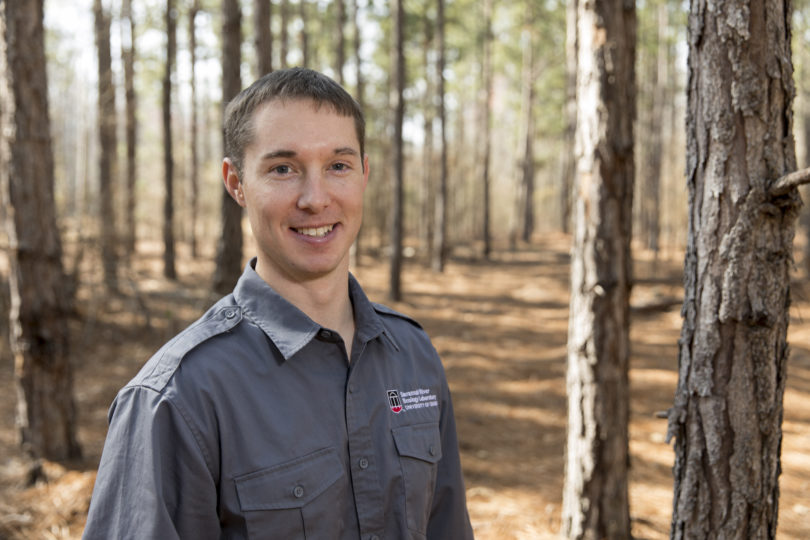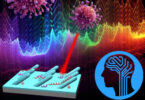James Beasley, an associate professor at the Savannah River Ecology Laboratory and the Warnell School of Forestry and Natural Resources, conducts research that explores issues ranging from invasive species management to the impacts of nuclear accidents on wildlife populations.
Where did you earn degrees and what are your current responsibilities at UGA?
I received an associate degree from Paul Smiths College in New York, a B.S. from SUNY Environmental Science and Forestry, and an M.S. and Ph.D. in wildlife ecology from Purdue University. I am currently an associate professor of wildlife ecology with a split appointment between the Savannah River Ecology Laboratory and the Warnell School of Forestry and Natural Resources. My primary responsibilities are to conduct research, mentor graduate students, teach courses and perform some service-related duties.
When did you come to UGA and what brought you here?
I came to UGA in summer of 2012 to join the faculty at the Savannah River Ecology Laboratory and the Warnell School of Forestry and Natural Resources. For me this was an opportunity to join as a faculty member in two of the most storied wildlife research programs in the country. Being located at SREL was particularly appealing, as it allows me to remain actively involved in field research.
What are your favorite courses and why?
I currently teach two courses, an online course (Wildlife in America) and a hands-on field-based course (Field and Molecular Techniques in Wildlife Research and Management). I thoroughly enjoy teaching both these courses, but for quite different reasons. The target audience of my Wildlife in America course is students from other disciplines, who might generally be aware of some issues related to wildlife conservation and management but have little or no formal training on these topics. As non-majors, students often walk away from this course inspired with a more informed and deeper interest in the conservation and management of wildlife, which as a teacher is highly rewarding. My field-based course is a 10-day intensive course where students are immersed in the field and lab, gaining hands-on experience learning and applying wildlife techniques within a research setting. By necessity this is a small class, so I am able to closely interact with all the students throughout the entirety of the course. I particularly enjoy the opportunity to get out into the field with students and share my passion for conducting wildlife research.
What are some highlights of your career at UGA?
I have been extremely fortunate to have worked with many incredible students and faculty during my career at UGA thus far. Since arriving at UGA I have had the privilege to travel across the globe conducting research, which has taken me to places I never would have seen otherwise. In particular, since 2012 I have been conducting research in the human exclusion zones created following the nuclear accidents in Chernobyl and Fukushima, and have traveled to these abandoned landscapes nearly a dozen times over the last several years. Along with my collaborators, our research has led to the discovery of abundant populations of a diverse community of large mammals in these areas. I have been fortunate to have been invited to share the results of this research at several distinguished events, including a TED talk and a presentation at NASA’s Goddard Space Flight Center.
I also have been honored to receive several awards since arriving at UGA. In 2018 I received the Fred C. Davison Early Career Scholar award at UGA, and in 2019 was selected as an Early Career Fellow by the Ecological Society of America and received the Herrick Superior Teaching Award in Warnell. Over the last five years I also have had the unique opportunity to serve as the International Atomic Energy Agency’s wildlife advisor to the Fukushima government in Japan in response to the 2011 nuclear accident, which has provided me the opportunity to travel to Japan nearly a dozen times thus far and have a direct impact on the recovery of that region.
Finally, since arriving at UGA I have had the opportunity to mentor several dozen graduate students and technicians. Being able to help these students develop professionally and watch them go on to have successful careers of their own is by far the most rewarding aspect of my job.
How do you describe the scope and impact of your research or scholarship to people outside of your field?
My research interests are broad, but the central theme of my research program is understanding the impact of human activities on wildlife. Because of this, most of my research is applied, so inherently the majority of the work we do in my lab is trying to address research questions that people can relate to in their everyday lives. Whether it is research focused on reducing the spread of raccoon rabies, understanding the impacts of pollution on the health of wildlife and potential exposure risks to humans (e.g., hunters), studying the impacts of nuclear accidents on wildlife populations, or better understanding the ecology of invasive species to improve the efficacy of management, my research program is focused on developing science-based solutions to mitigate human-wildlife interactions.
How does your research or scholarship inspire your teaching, and vice versa?
I believe teaching and research activities are most effective when they are integrally linked. Many students learn most effectively when they are able to develop personal connections to the material discussed in the classroom. I routinely integrate current events as well as stories and experiences from my research in my teaching, which allows me to share my passion for research with my students and provides a tangible link to how the material we are covering is relevant beyond the classroom. Faculty also learn from students, who often bring a fresh perspective and new ideas to research that I find exciting.
What do you hope students gain from their classroom experience with you?
I hope that my students come away inspired to become more active participants in the conservation and management of wildlife, regardless of their eventual career path. I also believe it is important that students leave with the ability to think critically, so they are prepared to navigate through the vast amount of information out there to develop objective opinions. Along this line, it is important for students to be open minded and appreciate that there are often multiple viewpoints surrounding an issue, and to be able to share their perspectives in a way that is respectful of others.
Describe your ideal student.
For me an ideal student is highly motivated, inquisitive, passionate about their work, and can think critically.
Favorite place to be/thing to do on campus is …
My primary office is at the Savannah River Ecology Laboratory, in Aiken, South Carolina, so I don’t get to spend as much time on campus as most other faculty. But, when on campus I enjoy grabbing lunch with students and faculty at some of the local restaurants.
Beyond the UGA campus, I like to …
I have always been drawn to the outdoors, so in my free time I enjoy spending time outdoors hunting, fishing, and hiking with my family. I also enjoy traveling and experiencing new places and cultures.
Community/civic involvement includes …
Since 2014 I have been traveling to Japan with the International Atomic Energy Agency to provide guidance to the local government as they continue monitoring and remediation efforts in response to the 2011 nuclear accident. This has been a unique opportunity to share my expertise in a way that I hope will have a positive impact on the recovery of that region and the communities that were impacted by the accident.
Favorite book/movie (and why)?
I have fairly diverse interests, but I particularly enjoy reading outdoor adventure books like “Into Thin Air” by Jon Krakauer or “Death in the Long Grass” by Peter Capstick. I have young kids so I don’t read as much as I used to, but I also enjoy thriller novels whenever I can. I just finished reading “The Sixth Extinction: An Unnatural History” by Elizabeth Kolbert. Humans are having a profound impact on Earth’s ecosystems and the species that inhabit them, and this book does a great job of providing context and examples of how species are disappearing before our eyes at an alarming and unsustainable rate.
The one UGA experience I will always remember will be …
Although I have only been at UGA for seven years, I already have a tremendous number of experiences that I will carry with me for the rest of my life. If I had to pick just one, it would be when I was given the opportunity to give a TED talk on my research in Chernobyl and Fukushima at a TEDx event in Atlanta. To have been selected to give a talk at one of these events at such an early stage of my career was a great honor, and certainly nerve-racking!







